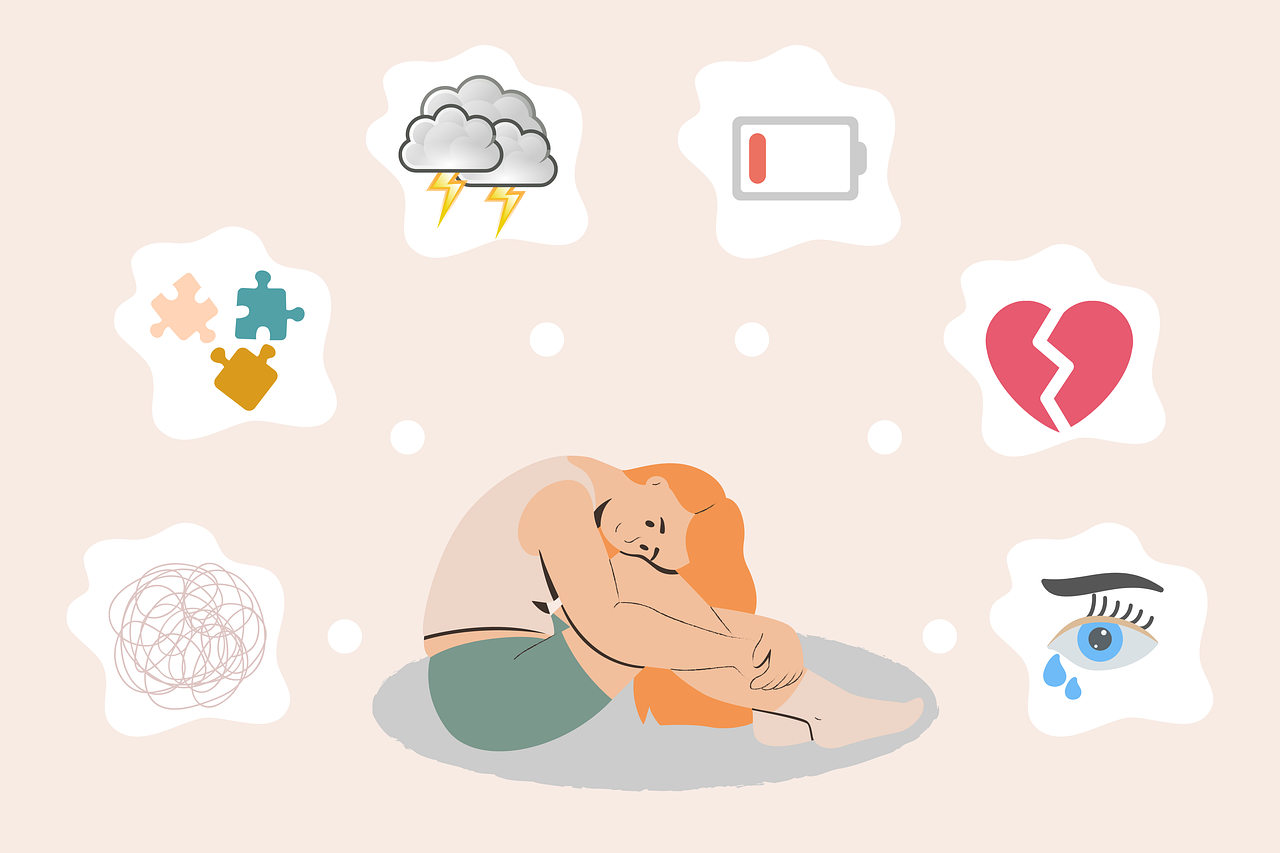When the Lines Blur: Understanding the Overlap Between ADHD, Anxiety, and Depression
Mental health is rarely black and white. In fact, one of the most complex parts of diagnosing and treating mental health conditions is the way symptoms of different disorders often overlap. This is especially true for Attention-Deficit/Hyperactivity Disorder (ADHD), anxiety, and depression. Though they are distinct conditions, they share many characteristics, making it difficult to tell them apart — and sometimes even harder to treat effectively.
In this post, we’ll explore how symptoms of ADHD, anxiety, and depression can look alike, why they co-occur so frequently, and how understanding their overlap can lead to better diagnosis and treatment.
Understanding the Core of Each Condition
Before we dive into the overlap, it helps to understand the foundational symptoms of each condition:
- ADHD (Attention-Deficit/Hyperactivity Disorder) is a neurodevelopmental disorder typically characterized by inattention, impulsivity, and sometimes hyperactivity. People with ADHD may struggle with organization, memory, time management, and staying focused.
- Anxiety Disorders include conditions like Generalized Anxiety Disorder (GAD), Social Anxiety Disorder, and Panic Disorder. These are marked by excessive worry, physical symptoms like restlessness or muscle tension, and avoidance behaviors.
- Depression (specifically Major Depressive Disorder) is characterized by persistent low mood, loss of interest in activities, fatigue, poor concentration, changes in sleep and appetite, and feelings of worthlessness or hopelessness.
While each has its own diagnostic criteria, it’s common for individuals to experience more than one of these conditions at the same time.
Where Symptoms Overlap
Let’s look at how these conditions share similar symptoms — and why that can lead to misdiagnosis or missed diagnosis altogether.
1. Difficulty Concentrating in ADHD, Anxiety, and Depression
One of the most common overlapping symptoms is difficulty with attention and concentration.
- In ADHD, attention issues are a core symptom. The brain struggles to regulate attention, which can result in frequent distractions, forgetfulness, and mental restlessness.
- In anxiety, concentration problems often come from being mentally preoccupied with worries or fears.
- In depression, lack of focus may result from slowed cognitive processing, fatigue, or disinterest.
Although the underlying cause is different, the experience — being unable to focus — can look similar across the board.
2. Restlessness and Irritability Overlap in ADHD, Anxiety, and Depression
Feeling restless, agitated, or easily irritated is another shared trait.
- In ADHD, this may manifest as physical hyperactivity or a mental feeling of needing constant stimulation.
- In anxiety, restlessness stems from an overactive fear response and physiological arousal.
- In depression, irritability (especially in children and adolescents) may be more prominent than sadness, and restlessness can result from internal discomfort.
This makes it easy to confuse the hyperactivity of ADHD with the restlessness of anxiety or the agitation seen in depression.
3. Sleep Disturbances in ADHD, Anxiety, and Depression
Poor sleep is another hallmark symptom that cuts across all three conditions.
- People with ADHD may stay up late due to racing thoughts or difficulty unwinding (sometimes called “revenge bedtime procrastination”).
- Those with anxiety often experience insomnia, racing thoughts, or nightmares.
- Depression can cause both insomnia and hypersomnia (sleeping too much), depending on the individual.
Since sleep problems can worsen all mental health symptoms, they can also blur diagnostic clarity.
4. Low Motivation and Fatigue in ADHD, Anxiety, and Depression
Feeling tired, drained, or unmotivated is common in depression, but can also appear in ADHD and anxiety.
- In ADHD, low motivation may result from executive dysfunction — the brain’s difficulty with planning, prioritizing, or initiating tasks.
- In anxiety, exhaustion can stem from chronic worry and the physical effects of prolonged stress.
- Depression is marked by profound fatigue and lack of energy that doesn’t improve with rest.
Again, the cause may be different, but the behavior — such as missing deadlines, avoiding social situations, or neglecting self-care — may be the same.
Why the Overlap Matters
1. Misdiagnosis is Common
Many people are first diagnosed with anxiety or depression, only to later discover that ADHD was the underlying issue all along. Because ADHD often coexists with mood and anxiety disorders (in fact, about 60-70% of people with ADHD have a comorbid condition), it’s easy for clinicians and patients alike to focus on the more obvious symptoms like sadness or worry, rather than attention problems.
2. The Wrong Treatment Can Make Things Worse
Treating only one part of the picture may lead to poor outcomes. For example, someone with ADHD who is prescribed an antidepressant might not see much improvement in focus or motivation. Conversely, someone with anxiety who is mistakenly treated for ADHD might experience worsened symptoms if stimulants increase their physiological arousal.
Understanding the full picture allows for more targeted treatment — often a combination of therapy, medication, and lifestyle strategies.
How to Differentiate Between ADHD, Depression and Anxiety
Although symptom overlap can be confusing, there are subtle clues that can help differentiate between the conditions:
- Timing: ADHD symptoms typically appear in childhood, whereas anxiety and depression can emerge at any age.
- Trigger-based vs. Persistent: Anxiety is often triggered by specific thoughts or situations. Depression is more pervasive and mood-based. ADHD symptoms tend to be consistent regardless of context.
- Mood vs. Attention: If the primary complaint is feeling down or emotionally distressed, depression may be the root. If the main issue is distractibility or impulsivity, ADHD might be more likely.
- Mental vs. Physical Energy: Depression often includes a full-body heaviness or fatigue, while ADHD often involves mental restlessness despite physical tiredness.
Ultimately, a thorough evaluation by a mental health professional — including a detailed history and symptom tracking — is the best way to tease apart the differences.
Moving Toward Integrated Treatment
Whether you’re struggling with ADHD, anxiety, depression, or some combination, the good news is that effective treatments exist — and often overlap as well.
- Cognitive Behavioral Therapy (CBT) has been shown to improve symptoms in all three conditions by helping people reframe negative thinking and develop healthier coping strategies.
- Medication such as stimulants (for ADHD), SSRIs (for anxiety and depression), or combination treatments can be tailored based on a person’s specific symptom profile.
- Lifestyle Interventions like regular exercise, sleep hygiene, mindfulness, and time management techniques can help reduce symptoms across the board.
Final Thoughts
Mental health isn’t always neatly compartmentalized. ADHD, anxiety, and depression often weave together in complex ways, making diagnosis and treatment more challenging — but also more rewarding when done thoughtfully.
If you or someone you know is dealing with overlapping symptoms, know that you’re not alone. With the right support and a comprehensive approach, it’s entirely possible to untangle the threads and find strategies that help you feel more in control, more energized, and more like yourself. Contact us at Unstuck Therapy https://unstucktherapy.com/ if you are curious about untangling your specific needs and way of being in the world.
Sources
Hölzel, B. K., et al. (2011). Mindfulness practice leads to increases in regional brain gray matter density.
PubMed Central Full Text
Donald, J. N., et al. (2019). Does mindfulness work? A meta-analysis of workplace outcomes.
ResearchGate PDF
Glomb, T. M., et al. (2011). Mindfulness at work.
Emerald Insight
ResearchGate PDF
Ryan, R. M., & Deci, E. L. (2000). Self-determination theory.
Self-Determination Theory PDF
PubMed AbstractTaylor & Francis+4Experts@Minnesota+4Amazon+4
Segal, Z. V., Williams, J. M. G., & Teasdale, J. D. (2013). Mindfulness-Based Cognitive Therapy.
Guilford Press
Amazon
Gotink, R. A., et al. (2015). Mindfulness and mood regulation.
PubMed Central Full TextScienceDirect
Rubinstein, J. S., Meyer, D. E., & Evans, J. E. (2001). Executive control of cognitive processes in task switching.
APA PDF
PubMed AbstractPubMed+2American Psychological Association+2PubMed+2
Creswell, J. D., et al. (2016). Interoception and stress.
Frontiers in Psychology
Krasner, M. S., et al. (2009). Mindful communication in healthcare.
PubMed Abstract
JAMA Full Text
Wachs, K., & Cordova, J. V. (2007). Mindful relating.
Wiley Online Library
Schön, D. A. (1983). The Reflective Practitioner.
Taylor & Francis
Amazon
Grossman, P., Niemann, L., et al. (2004). Mindfulness-based stress reduction and health benefits.
PubMed Abstract
ScienceDirect





